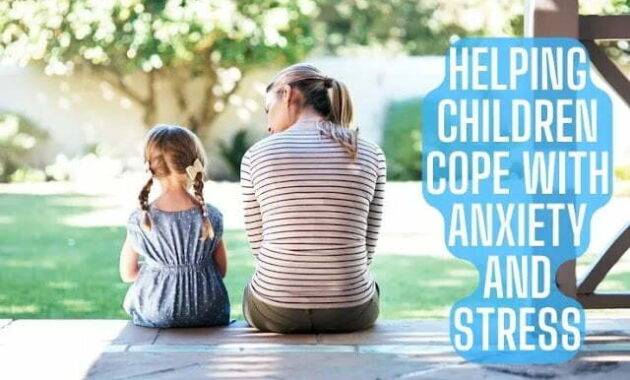Anxiety and stress are not just problems that adults face. Children can also experience these issues, and they can have a significant impact on their physical and emotional well-being.
Anxiety and stress in children can manifest in different ways, such as having trouble sleeping or eating, difficulty concentrating, or even engaging in self-harm.
Addressing these issues early on is crucial to help children develop healthy coping mechanisms and prevent long-term negative consequences.
Causes of Anxiety and Stress in Children
a. Biological factors
Children who have a family history of anxiety or depression are more likely to experience these issues themselves. Additionally, imbalances in brain chemistry and hormones can contribute to anxiety and stress.
b. Environmental factors
Stressful events such as divorce, moving to a new home, or changing schools can be triggers for anxiety and stress in children. Similarly, pressure to perform well in academics, sports, or extracurricular activities can be overwhelming and cause anxiety.
c. Trauma
Experiencing or witnessing traumatic events such as abuse, neglect, or violence can lead to anxiety and stress in children.
Signs and Symptoms of Anxiety and Stress in Children
Children express their emotions differently than adults. They may not have the words to explain how they’re feeling, and they may not know how to cope with these emotions.
As a parent, it’s essential to recognize the signs and symptoms of anxiety and stress in children so that you can take appropriate action to help them cope.
Here are some of the most common signs and symptoms of anxiety and stress in children, include:
a. Physical symptoms
Physical symptoms are the most noticeable signs of anxiety and stress in children. Some of the physical symptoms that you may notice in your child include:
- Headaches
- Stomach aches
- Nausea
- Dizziness
- Rapid heartbeat
- Sweating
- Shortness of breath
- Muscle tension
- Fatigue
- Insomnia
It’s important to note that some of these physical symptoms may be caused by an underlying medical condition. If you notice any of these symptoms in your child, it’s essential to consult a doctor to rule out any medical problems.
b. Behavioral symptoms
Behavioral symptoms are another sign of anxiety and stress in children. Some of the behavioral symptoms that you may notice in your child include:
- Avoidance of social situations or activities
- Increased irritability or anger
- Difficulty concentrating
- Restlessness or fidgeting
- Withdrawal from family or friends
- Excessive worrying or fearfulness
- Perfectionism
- Decreased appetite or overeating
It’s important to note that these behavioral symptoms may be a sign of other mental health conditions such as depression or ADHD. If you notice any of these symptoms in your child, it’s essential to consult a mental health professional.
c. Emotional symptoms
Emotional symptoms are another common sign of anxiety and stress in children. Some of the emotional symptoms that you may notice in your child include:
- Excessive crying or moodiness
- Low self-esteem or self-doubt
- Feeling overwhelmed or helpless
- Increased sensitivity to criticism or rejection
- Difficulty managing emotions
- Negative thinking or self-talk
- Increased anxiety or fearfulness
- Feeling of sadness or hopelessness
It’s essential to recognize that emotional symptoms can be just as significant as physical symptoms. If you notice any of these emotional symptoms in your child, it’s important to provide emotional support and seek professional help if necessary.
Recognizing the signs and symptoms of anxiety and stress in children is the first step in helping them cope with these issues. Keep an eye out for physical, behavioral, and emotional symptoms, and provide your child with the support and resources they need to manage their anxiety and stress..
Effective Strategies for Helping Children Cope with Anxiety and Stress
There are many strategies that parents and guardians can use to help children manage anxiety and stress. Some of these strategies include:
1. Talking to your child about their feelings
Encourage your child to express their feelings and emotions, no matter how small or insignificant they may seem. Validate their emotions and let them know that it’s normal to feel anxious or stressed.
2. Create a Safe and Supportive Environment
Children need to feel safe and supported in order to cope with anxiety and stress. Parents, guardians, and teachers can create a safe environment by being available to listen, providing a supportive space for children to share their feelings, and offering positive feedback and encouragement.
3. Teach your child mindfulness and relaxation techniques
Mindfulness and relaxation techniques such as deep breathing, meditation, and progressive muscle relaxation can help children calm their minds and reduce feelings of anxiety and stress.
4. Encourage Physical Activity
Physical activity is a great way to reduce anxiety and stress in children. Regular exercise can help children to release tension, improve their mood, and increase their overall sense of well-being.
5. Help Children Develop Coping Skills
Coping skills are strategies that children can use to manage stress and anxiety. These skills include positive self-talk, problem-solving, and cognitive restructuring. Teaching children these skills can help them to build resilience and cope with difficult situations.
6. Cognitive-behavioral therapy
Cognitive-behavioral therapy (CBT) is a type of therapy that focuses on changing negative thought patterns and behaviors that contribute to anxiety and stress.
7. Art and play therapy
Art and play therapy can be effective in helping children express their emotions and work through their anxiety and stress in a non-threatening way.
8. Foster Healthy Habits
Healthy habits like eating a balanced diet, getting enough sleep, and practicing good hygiene can help children to manage stress and anxiety. When children feel physically healthy, they are better equipped to cope with the challenges of daily life.
9. Establish a routine
Routines can help children feel safe and secure. Establish a consistent routine for bedtime, meals, and other daily activities.
10. Seek professional help
If your child’s anxiety or stress is severe or affecting their daily life, it may be time to seek professional help. A mental health professional can provide additional support and strategies to help your child cope with their emotions.
Prevention of Anxiety and Stress in Children
1. Promoting a healthy lifestyle
Encouraging children to eat well, exercise regularly, and get enough sleep can help prevent anxiety and stress.
2. Building resilience
Teaching children resilience skills such as problem-solving, positive thinking, and self-care can help them better cope with stressful situations.
3. Parenting styles
Parenting styles that promote autonomy, encourage open communication, and provide emotional support can help children develop healthy coping mechanisms and build resilience.
Conclusion
Anxiety and stress are common issues that can affect children’s physical and emotional health. Identifying the causes and symptoms of anxiety and stress in children and using appropriate strategies to help them cope can prevent long-term negative consequences.
Promoting a healthy lifestyle, building resilience, and using supportive parenting styles can also help prevent anxiety and stress in children.
FAQs
Is it normal for children to experience anxiety and stress?
Yes, it’s normal for children to experience anxiety and stress, but it’s important to address these issues early on to prevent long-term negative consequences.
What are some relaxation techniques that can help children cope with anxiety and stress?
Deep breathing, meditation, and yoga are all relaxation techniques that can help children calm their minds and reduce feelings of anxiety and stress.
How can parents help prevent anxiety and stress in children?
Promoting a healthy lifestyle, building resilience, and using supportive parenting styles can all help prevent anxiety and stress in children.
How can art and play therapy help children cope with anxiety and stress?
Art and play therapy can be effective in helping children express their emotions and work through their anxiety and stress in a non-threatening way.
When should I seek professional help for my child’s anxiety and stress?
If your child’s anxiety and stress are significantly impacting their daily life, it may be time to seek professional help from a therapist or mental health professional.


